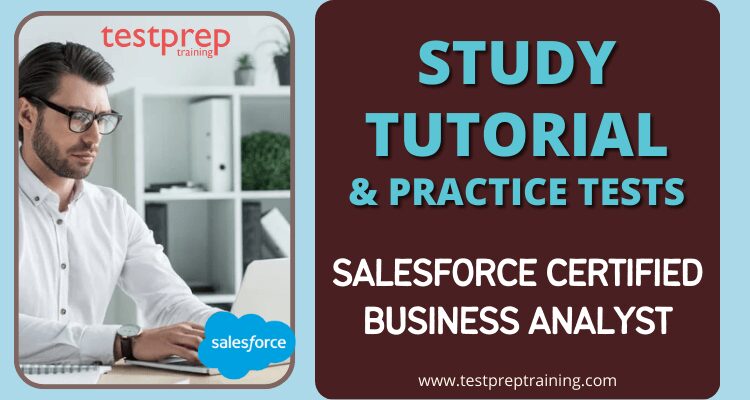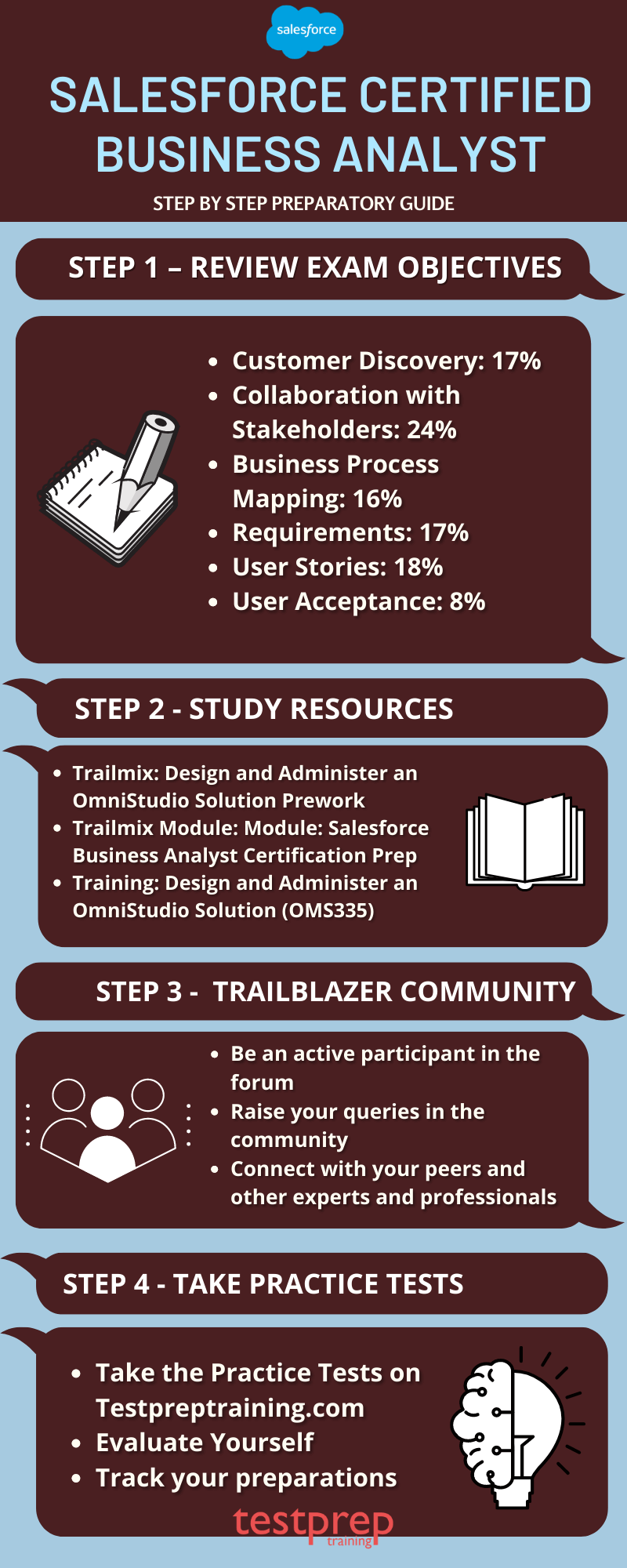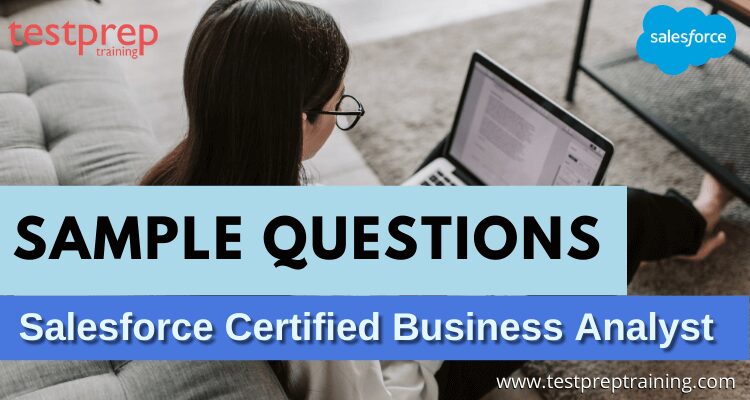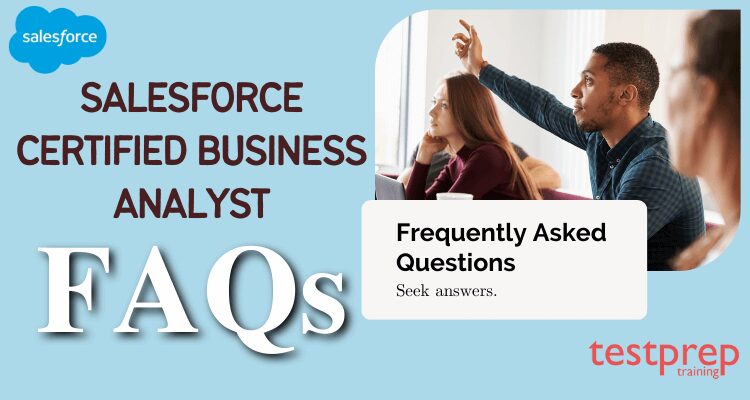Salesforce Certified Business Analyst

Success in the Salesforce Certified Business Analyst exam signifies the candidate’s ability to understand business needs, capture requirements, and collaborate with stakeholders to develop Salesforce solutions that improve business performance. In conjunction with stakeholders, a Salesforce Certified Business Analyst drives business improvement and ensures business needs are met. In addition to experience working on the Salesforce Platform (such as Sales Cloud, Marketing Cloud, and others), the candidate brings an in-depth understanding of a particular industry or domain.
What will you learn?
Candidates will have experience eliciting requirements, mapping business processes, writing user stories, validating solutions, facilitating virtual and in-person workshops, and validating solutions. Candidates will have a comprehensive understanding of various software development lifecycle methodologies and be able to apply Salesforce business analysis best practices, guide business stakeholders’ collaboration, and act as a liaison between business and development teams.
Prerequisites
Prior to sitting for your Business Analyst certification exam, you’re required to earn the Salesforce Administrator Credential.
Job roles of a Salesforce Certified Business Analyst?
- Business Analyst
- Consultant
- Business Systems Analyst
- Product Owner
- Platform Manager
- CRM Manager
- Business Process Specialist
- Business Operations
- Salesforce Administrator
- Business Excellence Leader
Exam Format and Information
| Exam Name Salesforce Business Analyst | Exam Code Winter’23 |
| Exam Duration 105 mins | Exam Format Multiple Choice and Multi-Response Questions |
| Exam Type Cloud Computing | Number of Questions 60 Questions |
| Eligibility/Pre-Requisite NIL | |
| Exam Language English | Pass Score 72% and above |
Required Experience
The Salesforce Certified Business Analyst has the following experience:
- 2 years of Business Analyst experience, including demonstrated success in owning and delivering business process improvements
- 2 years of Salesforce Platform experience
Salesforce Business Analyst Sample Questions
What Knowledge and Skills will you gain?
- Familiarity with the Salesforce implementation lifecycle.
- Understanding of Salesforce environment best practices.
- Experience in a given industry environment.
- Understanding of facilitation and documentation techniques.
- Planning discovery activities based on key stakeholders.
- Mapping business processes, eliciting requirements, and writing user stories.
- Demonstrating effective written and verbal communication skills when working with business and technical stakeholders at all levels of the organization.
- Applying strong analytical and problem-solving skills.
- Moving easily between a wide variety of influencing and communication styles for engaging effectively with diverse audiences and maximizing impact.
- Becoming a trusted advisor with key stakeholders.
- Breaking down complex business processes into manageable steps.
- Evaluating and recommending Salesforce features as part of solution design.
What are you not expected to know or do?
- Change management
- Managing a project
- Building ROI
- Developing custom code
- Designing a technical solution
- Ongoing administration of tools, product ownership
- Legal and compliance issues
For More Details See: Salesforce Certified Business Analyst FAQs
Course Outline
The Salesforce Certified Business Analyst course covers the following domains:
Customer Discovery: 17%
- Determine business strategies, goals, initiatives, and challenges to define the scope of a Salesforce project or business initiative.
- Discover how a customer is leveraging existing products to establish the current state.
- Understand and explain Business Analyst roles and responsibilities in different phases of the implementation lifecycle.
- Apply the implementation lifecycle for planning business analysis activities.
- Analyze the customer’s Salesforce environment(s) to identify opportunities and constraints.
- Demonstrate knowledge of Salesforce capabilities, align them with business needs, and recommend potential solutions.
Collaboration with Stakeholders: 23%
- Plan discovery activities based on the target stakeholders to perform a thorough analysis of business needs.
- Identify key stakeholders and develop relationships with them as a trusted advisor to act as a liaison between business and technical teams.
- Given a scenario, choose the most effective technique for eliciting business needs from stakeholders.
- Explain how to move from current state analysis to an agreed future state design.
- Given a scenario, manage competing priorities to obtain stakeholder consensus.
Business Process Mapping: 12%
- Demonstrate how to define the scope of a complex business process and break it down into manageable steps.
- Analyze and document a business process to elicit requirements and engage stakeholders to visualize a future state.
- Document business processes in a version controlled repository to manage scope.
Requirements: 18%
- Understand the differences between scope, requirements and user stories.
- Engage stakeholders to identify, validate, and prioritize requirements.
- Document requirements in a version controlled repository to manage scope.
User Stories: 18%
- Understand the components of a user story to perform thorough analysis.
- Demonstrate how to write acceptance criteria that convey the requirements and are ready for development.
- Document user stories in a version controlled repository to manage scope.
Development Support and User Acceptance: 12%
- Support and validate project delivery to ensure the solution meets the requirements.
- Support and validate user acceptance testing (UAT) to ensure the solution meets the requirements.
Preparation Guide for Salesforce Certified Business Analyst Exam
The purpose of this exam guide is to guide you through the Salesforce Certified Business Analyst exam preparation process. The purpose of this guide is to help you achieve a passing score by providing you with information about the target audience and recommended training and documentation for the Salesforce Business Analyst exam. In order to maximize your chances of passing the Salesforce certification exam, Salesforce highly recommends combining on-the-job experience, course attendance, and self-study.

Trailmix: Design and Administer an OmniStudio Solution Prework
A trail is an organized learning path through modules and projects that helps you cover the ground in the shortest amount of time. Take them into consideration when developing your own game plan and complete this Trailmix before attending OMS335 expert-led training
Module: Salesforce Business Analyst Certification Prep
A comprehensive module that covers topics to study and real-life questions that are relevant to the exam. It provides interactive flashcards, links to resources, and real-world questions. In this unit, you’ll be able to:
- Learn About Customer Discovery
- Review Collaboration with Stakeholders
- Study Up on Business Process Mapping
- Review Requirements
- Refresh Your User Story Skills
- Explore User Acceptance
Trailhead Academy for Expert-led courses
It is highly recommended that you take the Design and Administer an OmniStudio Solution (OMS335) training course prior to taking the test. It is aimed at administrators, consultants, and business analysts within the Salesforce Industry ecosystem who want to learn how to design human-centric Salesforce solutions with OmniStudio. Salesforce concepts and functionality should be thoroughly understood, as well as familiarity with the interface.
Join the Trailblazer Community
A trailblazer is a pioneer, an innovator, and a lifelong learner. Almost 80% of respondents report enhanced productivity and 93% report improved innovation as a result of participating in their communities. When you join the community, you will have access to various benefits, including skills training, access to Trailblazers around the world, and the opportunity to give back. The Trailhead modules are integrated with trailblazer knowledge to help you develop a broad skill set. In addition, you can ask questions on key topics and learn from Trailblazers.
Evaluate your preparation with Practice Tests
It’s now time to put your knowledge to the test once you’ve completed the preparation. You will find out your core strengths and weaknesses by taking a sufficient number of practice tests. Besides helping you build confidence, they also teach you time management skills. Furthermore, Practice Tests simulate the real exam environment, allowing the candidates to better prepare for it.



